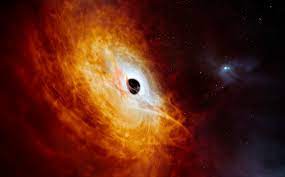Brightest Quasar ever discovered reveals cosmic Marvel with Record-Breaking Black Hole

Astronomers have recently unveiled the discovery of J0529-4351, the brightest quasar ever observed, with an unprecedented luminosity surpassing 500 trillion times that of the sun. What makes this quasar even more extraordinary is its association with the fastest-growing black hole on record, estimated to be between 17 and 19 billion times the mass of the sun. This colossal black hole devours a mass equivalent to over one solar mass every day, setting a new standard for cosmic voracity.
Situated an astonishing 12 billion light-years away from Earth, the light from J0529-4351 provides a unique opportunity to explore the universe’s early stages.
The quasar’s brilliance allows astronomers to peer into a cosmic era when the universe was merely around 2 billion years old.
Despite being initially spotted over four decades ago in the Schmidt Southern Sky Survey, its extreme luminosity led to misclassification, with astronomers initially mistaking it for a nearby star.
The quasar’s true identity was uncovered in 2023 when astronomers revisited the object’s region using the 2.3-meter telescope at the Siding Spring Observatory in Australia.
This groundbreaking discovery sheds light not only on the extraordinary nature of J0529-4351 but also on the challenges astronomers face in identifying such celestial objects amidst vast datasets.
The team responsible for this breakthrough emphasizes the importance of continuous exploration and the thrill of discovery in unraveling the mysteries of the cosmos.
The findings have been published in the journal Nature Astronomy, opening up new avenues for further investigation and contributing to our understanding of the universe’s dynamics and evolution.
As technology advances, future observations with instruments like the upgraded GRAVITY + at the Very Large Telescope and the upcoming Extremely Large Telescope (ELT) will provide additional insights into the characteristics and behavior of this unprecedented quasar.












